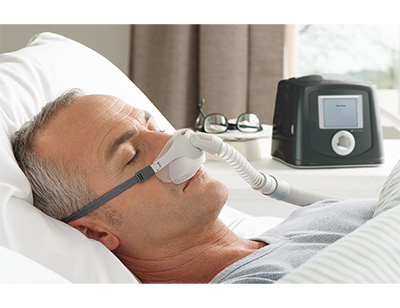Getting Used to Your CPAP Machine

At SleepRight McKinney, we specialize in the treatment of sleep apnea so that our patients can get the quality night’s rest they deserve. For many patients who receive an obstructive sleep apnea diagnosis from Dr. Lawrence, we offer a variety of alternative treatment options other than a CPAP machine. Unfortunately, not every patient with obstructive sleep apnea can successfully treat their apnea by wearing these types of devices.
Patients with severe sleep apnea may need to use a CPAP machine at night to fully treat their disorder. Oral appliance therapy and NightLase can successfully treat most patients, but for those with the most severe forms of the sleep disorder, CPAP may be their only option.
Wearing a CPAP machine at night gets a bad rap. Dealing with chords, tubes, and a face mask can overly complicate your ability to relax and fall asleep. Many patients usually worry about the noise a CPAP machine might make, and what it takes to keep it clean.
While there may be some initial hurdles that you’ll need to overcome, it beats the alternative of not treating or undertreating your sleep apnea. Once you know how to operate your machine, you’ll discover that sleeping with a CPAP can provide you with the quality rest you require.
Getting to Know Your Gear
Patients with sleep apnea briefly stop breathing throughout the night, up to 30 or more times an hour, when their airway closes or becomes blocked. CPAP, which stands for continuous positive airway pressure, pushes air through the airway to keep it open.
Your CPAP is made of three important parts: the main component that pumps and controls the airflow, a tube that carries the air from the machine to you, and a mask that goes over the nose, mouth, or both.
Using a CPAP at night requires getting used to a few things that include:
Mask and straps: Most of us like to sleep as unencumbered as possible. If you’ve never slept with something over your face before, such as a night mask, you’ll probably need some time getting used to wearing a CPAP mask.
The latest types of masks usually fall into one of three groups:
- Nasal mask that fist over the nose
- A nasal pillow mask that fits under the nose
- A full mask, which covers both the nose and mouth
For a CPAP machine to work properly, the mask must remain sealed. Otherwise, the air pressure will leak out and your airway won’t stay open. Finding the right mask will depend on your own personal preference. You may need to try different types before you find one that provides the ideal combination of comfort and performance needed to help you sleep better. Dr. Lawrence can help you find the right mask for you.
Noise: In the past, CPAP machines had a deserved reputation as loud and clunky machines. They could keep patients up at night from the sound of air being pushed out or from random clicking or ticking sounds.
However, CPAP machines today are state-of-the-art and whisper quiet. They are also smaller and more portable than ever. You won’t notice the sound made by a modern CPAP machine any more than the ticking of a clock or the turning on of your air conditioner.
Pressure: CPAP machines today are highly customizable, and feature a variety of different air pressure settings. Some of the latest CPAP machines even have automated settings that continually adjust pressure throughout the night based on what information it receives from internal sensors.
Dr. Lawrence can also provide patients with advice on how to set their CPAP machines based on the information collected from their sleep study.
Dryness: A common complaint of older model CPAP machines was that it forced patients to breathe in dry air all night long. CPAP models today contain internal humidifiers to alleviate this problem and keep the air you breathe comfortable.
Learning to Love Your CPAP
Wearing a CPAP machine at night will certainly require some adaptation. However, for patients with severe obstructive sleep apnea, the alternative to not using the machine places to great a risk on your long-term health. Patients with untreated or undertreated sleep apnea are twice as likely to die of heart disease.
Don’t let a fear of CPAP keep you from getting the treatment and sleep you need. Contact our office today to schedule your sleep consultation with Dr. Lawrence, and learn just how far CPAP has come.

